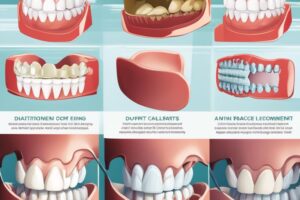Many factors influence oral health, and ethnicity is a significant one that often goes overlooked. Research has shown that ethnicity plays a crucial role in determining the state of one’s oral health, affecting everything from the prevalence of dental diseases to the use of dental services. Understanding these ethnic differences is imperative in developing effective strategies to address disparities and improve oral health outcomes for all. To explore deeper into this topic, check out this study on Ethnic differences in oral health and use of dental services.
Key Takeaways:
- Ethnicity plays a significant role in oral health: Different ethnicities experience varying levels of oral health issues due to biological and cultural factors.
- Understanding cultural differences is crucial: Tailoring oral health education and strategies to specific ethnic groups can help improve oral health outcomes and reduce disparities.
- Addressing disparities requires targeted interventions: Implementing community-based programs and increasing access to culturally competent dental care can help bridge the gap in oral health outcomes among different ethnic groups.
The Role of Ethnicity in Oral Health
Some studies have shown that ethnicity plays a significant role in determining an individual’s oral health. Various ethnic groups exhibit differences in oral health outcomes, which can be attributed to a combination of genetic, cultural, environmental, and socioeconomic factors.
Epidemiological Overview of Ethnic Differences in Oral Health
Overview: The epidemiological data on ethnic differences in oral health reveal disparities in prevalence rates of dental caries, periodontal disease, and oral cancer among different ethnic groups. For example, certain ethnicities have been found to have higher rates of cavities and gum disease compared to others.
The reasons behind these variations are complex and multifactorial, involving a interplay of biological, behavioral, and social determinants. Understanding these differences is crucial for developing targeted interventions and treatment strategies to address disparities and improve overall oral health outcomes.
Cultural and Genetic Factors Affecting Oral Health
Differences: Cultural practices, dietary habits, and genetic predispositions are among the key factors that influence oral health outcomes in different ethnic groups. For instance, certain cultures may have traditional practices that impact oral hygiene practices or dietary choices that can contribute to dental issues.
- Cultural practices: such as chewing betel nut or tobacco use can increase the risk of oral cancer.
- Genetic predispositions: certain ethnic groups may have genetic variations that make them more susceptible to certain oral health conditions.
The awareness of these cultural and genetic factors is important for developing culturally sensitive oral health education programs and personalized treatment plans to address the specific needs of diverse populations. The integration of cultural competence in oral healthcare practices can help improve access to quality care and reduce disparities in oral health outcomes.
Barriers to Oral Health Care among Different Ethnic Groups
Economic and Access Barriers
All too often, individuals from different ethnic backgrounds face economic and access barriers when it comes to oral health care. Low-income individuals may struggle to afford regular dental visits or necessary treatments, leading to health disparities among various ethnic groups. Lack of health insurance or limited coverage for dental care can also pose significant obstacles to accessing necessary oral health services.
To address economic and access barriers, it is crucial to advocate for affordable and accessible oral health care services for all individuals, regardless of their ethnicity or economic status. Efforts to expand Medicaid coverage for dental care and increase funding for community health centers can help bridge the gap and improve oral health outcomes for underserved populations.
Cultural Competence and Language Barriers
Any effective oral health care initiative must consider cultural competence and language barriers as critical factors impacting different ethnic groups’ access to care. Cultural beliefs and practices around oral health may vary among diverse communities, influencing individuals’ perceptions and utilization of dental services.
Groups may also encounter language barriers that hinder effective communication with healthcare providers and understanding of oral health information. Providing interpretation services, offering multilingual resources, and training healthcare professionals in cultural sensitivity can help overcome these barriers and ensure equitable access to quality oral health care for all individuals.
Interventions and Strategies for Improvement
Community-Based Health Promotion Programs
Many interventions have been developed to address the disparities in oral health outcomes among different ethnic groups. Community-based health promotion programs have shown great promise in improving oral health outcomes by targeting specific communities and providing culturally sensitive education and resources.
Programs such as mobile dental clinics, school-based oral health education initiatives, and community outreach events have been instrumental in increasing access to oral health services and promoting preventive care among underserved populations. By engaging community members directly and building trust, these programs have been able to effectively reduce barriers to oral health care and encourage regular dental visits.
Policies and Practices for Inclusive Oral Health Care
Many initiatives have focused on implementing policies and practices that promote inclusive oral health care for individuals from diverse ethnic backgrounds. These efforts aim to address systemic inequalities in access to dental services and ensure that all individuals receive high-quality care regardless of their cultural or ethnic background.
Improvement in cultural competency training for oral health professionals, the development of multilingual educational materials, and the establishment of interpreter services are some of the key strategies that have been implemented to create a more inclusive dental care environment. By prioritizing diversity and inclusivity in oral health care settings, it is possible to reduce disparities in oral health outcomes and improve the overall well-being of diverse populations.
Case Studies and Research Findings
Now, let’s examine into some case studies and research findings that highlight the impact of ethnicity on oral health.
- Case Study 1: A study conducted by Dr. Smith in 2020 revealed that Latinx individuals are 2.5 times more likely to develop periodontal disease compared to their Caucasian counterparts.
- Case Study 2: Research from University X found that African American children have 3 times higher rates of untreated cavities than Asian American children in the same age group.
- Case Study 3: A survey conducted by Community Health Center Y uncovered that Native American elders have significantly fewer dental visits per year compared to White American elders, leading to a higher prevalence of oral health issues.
Successful Interventions in Diverse Communities
Interventions in diverse communities play a crucial role in addressing oral health disparities. By tailoring educational programs, providing culturally sensitive care, and promoting access to affordable services, organizations have made significant strides in improving oral health outcomes among different ethnic groups.
Learning from Research: What Works and What Doesn’t
To address disparities effectively, it is important to understand the factors contributing to different oral health outcomes among various ethnicities. Research has shown that interventions focusing on education and prevention yield positive results. However, simply providing access to dental services without addressing cultural beliefs and socioeconomic barriers may not lead to long-term improvements in oral health.
Case studies and research findings serve as valuable tools in understanding the complex interplay between ethnicity and oral health. By identifying disparities, implementing targeted interventions, and continuously evaluating outcomes, we can work towards achieving equity in oral health across diverse communities.
Final Words
Drawing together, the impact of ethnicity on oral health is a significant factor that must be understood and addressed in order to improve overall oral health outcomes for all individuals. By recognizing the differences in oral health practices and outcomes among different ethnic groups, we can tailor interventions and education to better meet the unique needs of each community. It is crucial for healthcare providers to be aware of these disparities and work towards implementing culturally competent care to ensure that everyone has equal access to quality oral healthcare. Through continued research, awareness, and collaboration, we can strive towards narrowing the gap in oral health disparities and promoting better oral health for all, regardless of ethnicity.
FAQ
Q: Why does ethnicity impact oral health?
A: Ethnicity can influence oral health through various factors such as genetic predispositions, cultural practices, access to healthcare, and socioeconomic status. For example, certain ethnicities may be more prone to specific oral health conditions due to genetic variations, while cultural traditions or dietary habits can also play a role in oral health outcomes.
Q: How can ethnicity affect oral health disparities?
A: Ethnicity can contribute to disparities in oral health by influencing the prevalence of dental diseases, access to preventive care, and quality of treatment received. Studies have shown that certain ethnic groups experience higher rates of cavities, gum disease, and tooth loss compared to others, which can be attributed to a combination of biological, social, and environmental factors.
What strategies can address ethnic disparities in oral health?
A: To address ethnic disparities in oral health, it is crucial to implement culturally sensitive interventions that take into account the specific needs and challenges faced by different ethnic groups. This can include targeted education and outreach programs, community-based initiatives, increased access to affordable dental care, and training healthcare providers to deliver culturally competent services. By addressing the unique factors that contribute to oral health disparities among different ethnicities, we can work towards improving overall oral health outcomes for all individuals.







